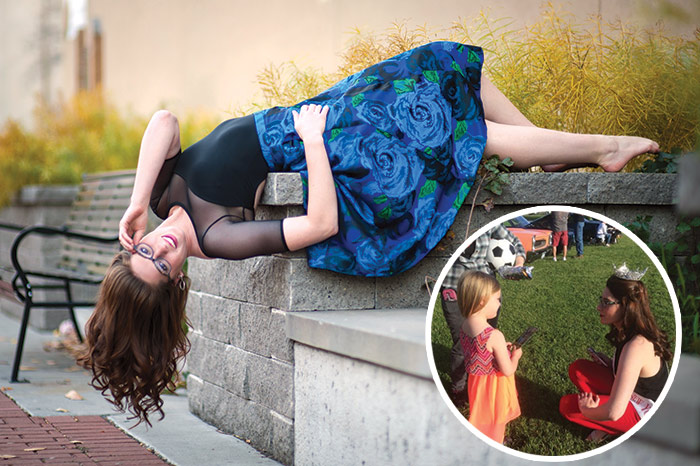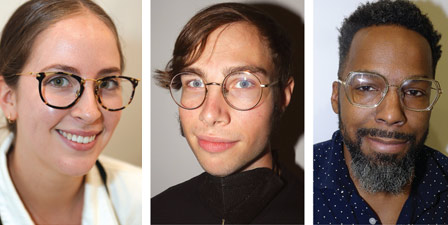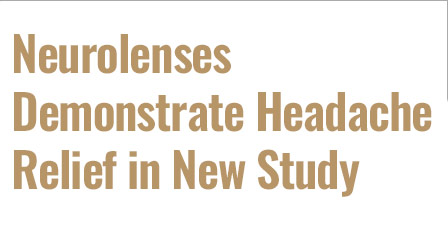
By Nina Zesky
This is my story about Convergence Insufficiency (CI). Simply stated, CI occurs when your eyes don’t work together while you are trying to focus. I am currently a senior at the University at Buffalo, studying Environmental Design in the Architecture Department. I have a 3.8 GPA; I am a trained gymnast and a high jumper for the university’s track and field team. I also happen to be a Miss America local title-holder. None of this came easily for me and here is why; I was not diagnosed with CI until I was 17 and about to graduate from high school. I was seen by several doctors who told my parents multiple times that my eyesight was fine, and I was faking not being able to see.
I often complained that I couldn’t see the board, but I also couldn’t see my notepad to take notes. I read very slowly and often drifted off in class. I had one teacher tell my mom that I might have restless leg syndrome because I was fidgety and would often just stand up in class. I had a hard time concentrating on class work and taking notes. I panicked if I were called on to read out loud. But my grades were always fine. I was also socially awkward and felt left out most of the time. I really had no idea why, but now I know it’s because I couldn’t focus on a person’s face, and I felt like I was always trying to catch up to everyone. If you look at me in pictures, I am never looking at the camera. I also suffered from severe headaches. These are all symptoms of CI. I have since discovered many kids who have CI are often diagnosed with ADHD or other behavioral issues.
I was also clumsy, often falling down stairs, running into walls or falling off the balance beam during the simplest of moves, ripping ligaments in my ankle and ending my gymnastics career. My parents took me to doctors, but our insurance led them to corporate chains, and I always passed the basic tests at the pediatrician’s office and during the school’s eye exams. These tests took a long time, because the longer I concentrated on an object, the clearer the object becomes, so eventually I would pass the eye exam.
The final straw for my parents was during the arduous task of teaching me to drive. My mom told me to make the next right, and when I did, I ended up in a ditch. I told her I see double all the time, and I could not determine which road was the correct one while traveling at 30 miles per hour. Luckily, my mother had developed a rapport with a local ophthalmologist, Nita Saini, MD. After speaking in depth with her and going through a thorough eye exam, she told my mom that I had a neurological disorder, not a vision problem and finally helped me find a pair of glasses with the correct prism strength to help me see. I remember the first time I put them on, and I saw the shapes of the leaves on trees, not just a green blur.
My eyesight was not better, because it was never really the problem, but somehow the prism helps my eyes to focus. I have less headaches and much less eyestrain. Finding doctors to help continue this process and help with the correct prescriptions has been challenging; my original doctor left her practice to work more extensively with senior citizens. I went to three doctors before I found a doctor who also specializes in eye therapy. I eventually found the practice of Weiss, Savedoff and Ciccone in Manlius, N.Y. My insurance did not cover the therapy, but it was worth it. It helped me realize I do have some control over the disorder.
I am now the only Miss America local contestant to ever wear glasses in all phases of the competition. I get asked all the time, “Why can’t you just wear contacts?” I have also been told that I would be “much prettier” without my glasses. I have explained numerous times that contacts cannot be worn for prescriptions that contain a prism. I created a program called “You Be the Hero” where I have spoken to thousands of children about finding their courage and confidence to speak up for themselves in order to keep themselves and others safe. I use my story as an icebreaker and tell them about my experiences with feeling left out and being bullied. I speak to children about finding their courage to be different, and I hope that my message can get to children and parents, that glasses or whatever makes you different, makes you beautiful. Last year, I was contacted by Arleo Eye Associates in Ithaca, N.Y. An optician, Carey Reeves, was aware of my story and saw me compete in a local pageant. Her practice supported me with glasses that are perfect for the amount of activities I am involved in. I was given three pairs of glasses from Europa International. These included a State Optical (made in USA) pair, the Halstead, and the two Rx frames from Europa’s Scott Harris collection, styles 426 and 320. All were fitted with Varilux Lenses with Crizal Avance. The lab work was performed by Winchester Optical in Elmira, N.Y.
I hope that my message will encourage children and their parents to keep asking for help if you think your child is being improperly diagnosed. I often wonder if I was given a pair of glasses many years ago, how different my life would have been.













